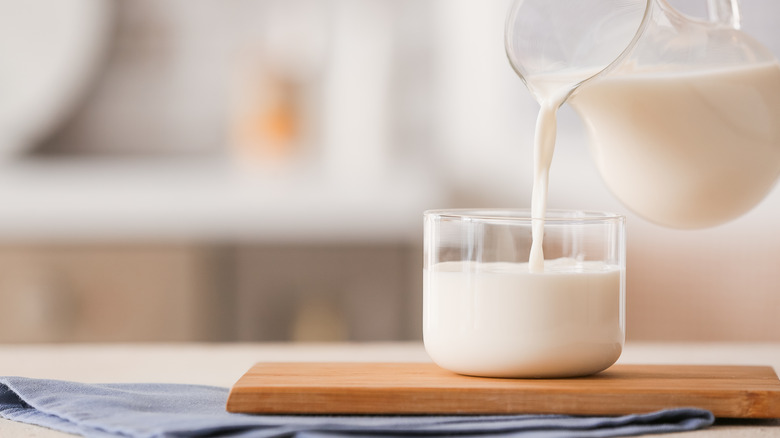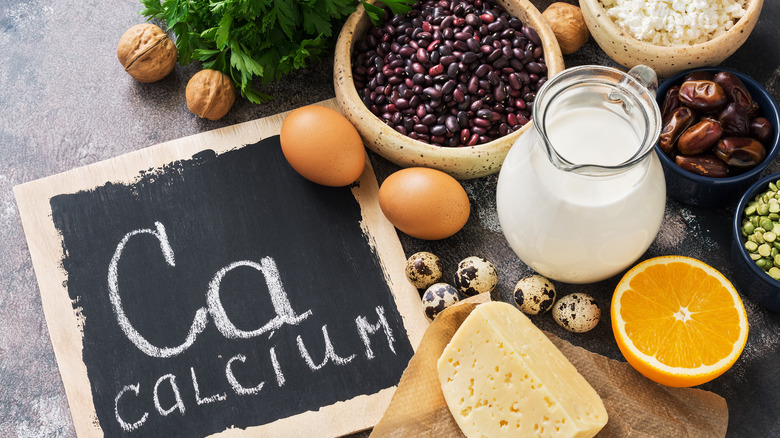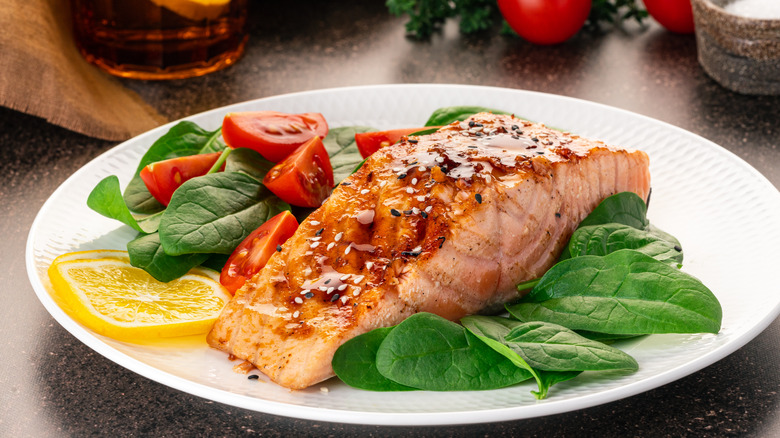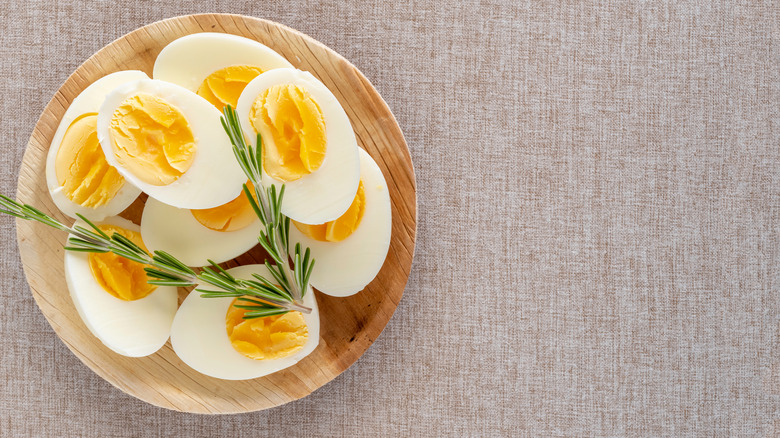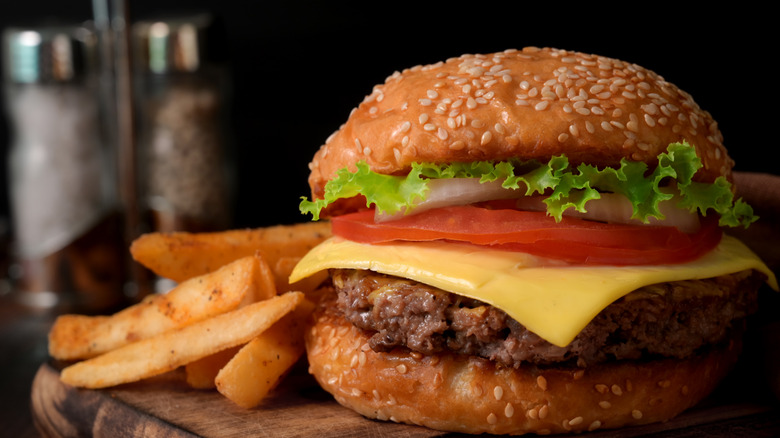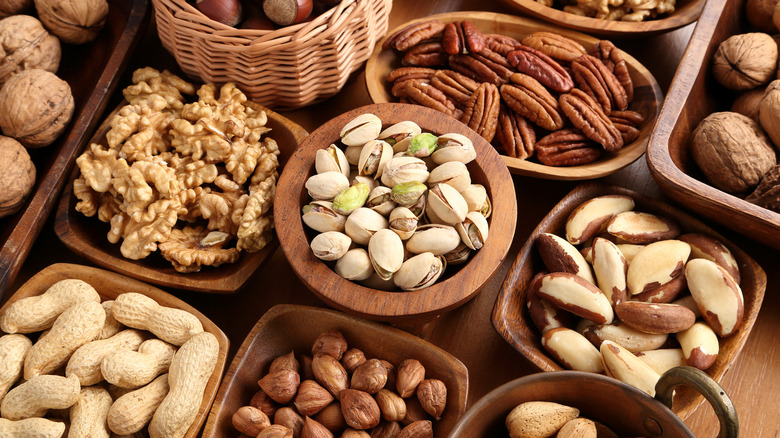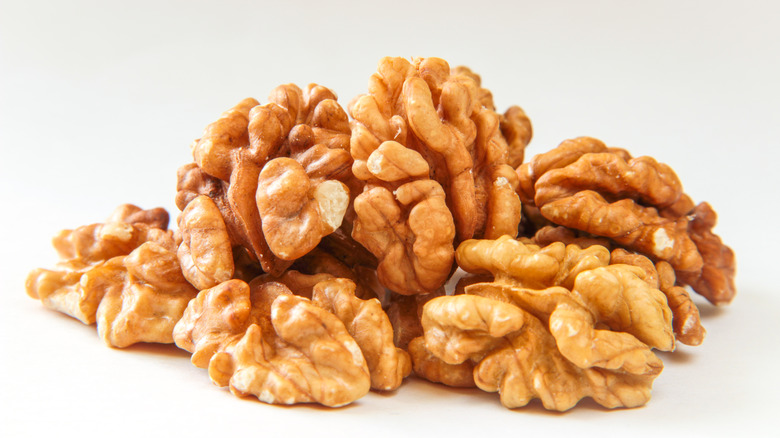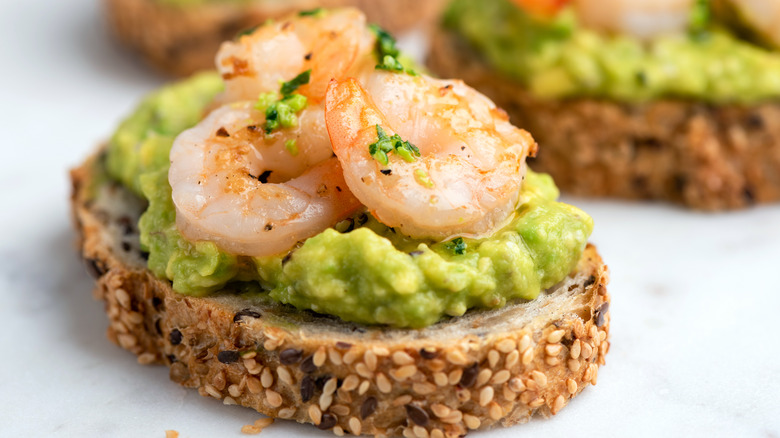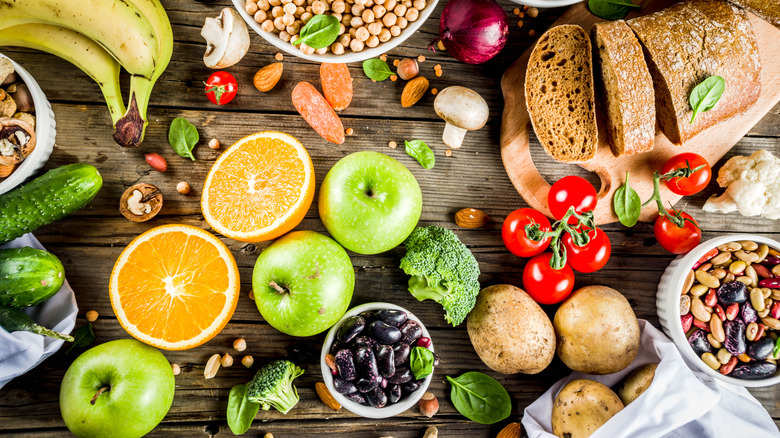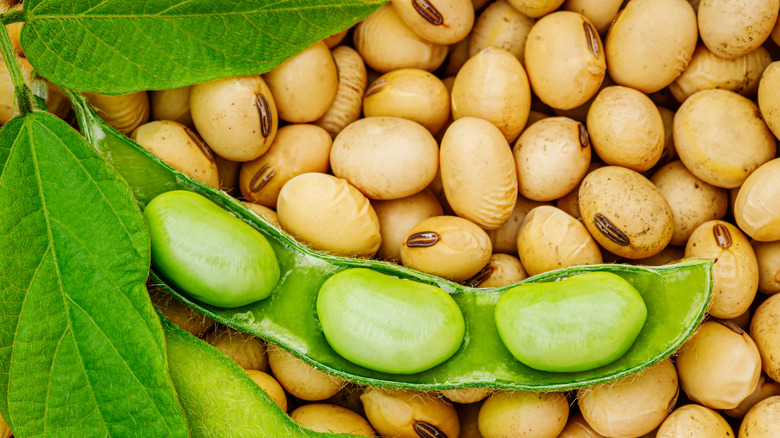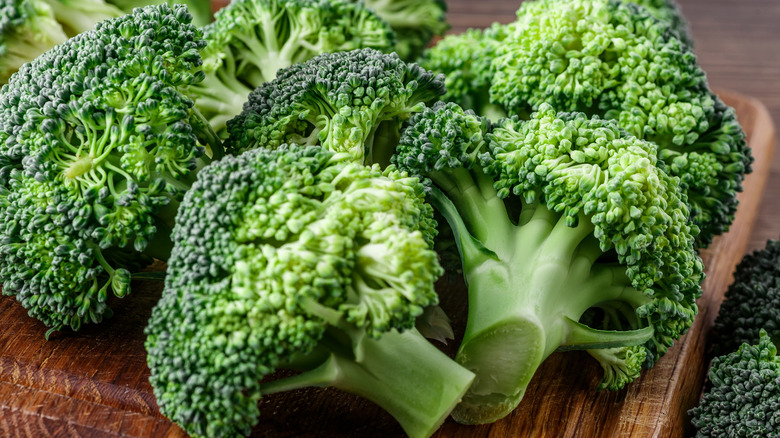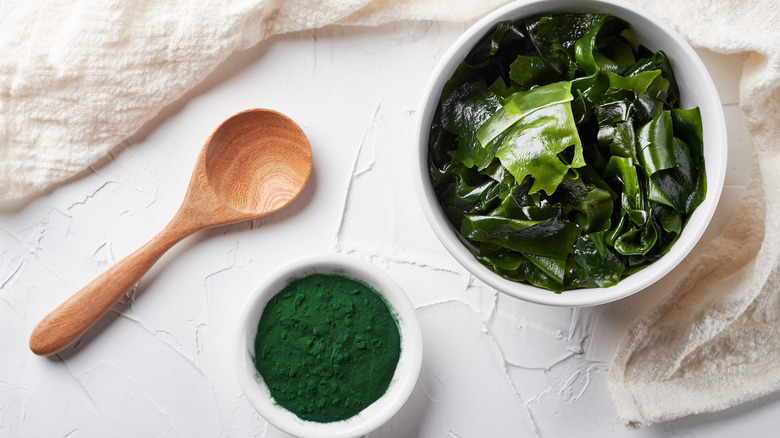8 Foods To Eat And 8 To Avoid When You Have Hypothyroidism
The thyroid is a gland that's responsible for a bunch of bodily processes, including metabolism and brain development. Without the thyroid signaling to your body that it's time to use energy, several processes can get out of whack. A thyroid that is overactive or underactive can cause problems with energy, weight loss or gain, or heart function (via WebMD).
Hypothyroidism is a condition in which the thyroid is underactive and doesn't produce enough thyroid hormone for these processes to happen normally in the body. It's actually quite common — about five out of 100 Americans have the condition, according to the National Institute of Diabetes and Digestive and Kidney Diseases). Several celebrities and public figures, like Gina Rodriguez, Bernie Sanders, and Oprah Winfrey, have opened up about having hypothyroidism (via Verywell Health).
According to Mayo Clinic, weight gain, tiredness, depression, anxiety, and impaired memory are common symptoms of hypothyroidism. Of course, everyone with hypothyroidism is different and may respond to different diets. But according to Everyday Health, some diets contain thyroid-loving ingredients that could balance your body, like Gluten-free, paleo, and Mediterranean diets. And it's clear: No matter what you choose to eat with hypothyroidism, iodine needs to be a focus. The American Thyroid Association explains that iodine helps thyroid hormone production, and iodine deficiency is common in people with the condition.
Eat: Dairy
Dairy foods are some of the best sources of iodine, a key nutrient for people with hypothyroidism, according to the Office of Dietary Supplements. Number one on the list? Dairy foods.
Eating dairy is one of the best ways you can ensure that you're getting enough iodine in your diet, as it's one of the most plentiful natural sources of the nutrient. The Office of Dietary Supplements indicates that the average adult needs to get about 150 micrograms of iodine daily, while 250 micrograms might even be a better goal.
An NIH chart shows that dairy products have among the highest concentration of iodine, even in small servings. For example, just 1 cup of Greek yogurt has 116 micrograms, 1 cup of milk has 85 micrograms, and a ½ cup of ice cream has 21 micrograms. To ensure that you're not going overboard on fat and calories that are often prevalent in dairy products, switch to nonfat or low-fat versions. And fill up on other top sources of iodine from other food groups, like cod, whole wheat bread, and seaweed.
Avoid: Too many calcium-rich foods
Almost any nutrient can be "bad" for you if you get too much in your diet, and getting too much calcium is no exception. But people with hypothyroidism who are taking the medication levothyroxine to produce thyroid hormone should be especially careful about calcium in their diet. However, it's not so much the amount of calcium that's the problem, but more the time you ingest calcium that could cause an issue.
Research shows that calcium can decrease the efficacy of levothyroxine, making it unable to do its job to its full potential. When you take calcium and levothyroxine too close together, calcium acts as a blocker to prevent the medication from taking over with its synthetic hormones. A 2011 study published in Thyroid proved the relationship by giving adults different types of calcium supplements along with levothyroxine. Each supplement led to as much as a 25% deficiency in levothyroxine absorption compared to levothyroxine given alone.
That doesn't mean you need to avoid taking calcium altogether, though. Physician Todd B. Nippoldt told the Mayo Clinic that it's best not to take any calcium-containing products (like antacids) or food within a four-hour window of taking levothyroxine or another thyroid hormone replacement.
Eat: Fish high in omega-3s
When inflammation rears its ugly head, eating fish can be a good solution. Most fish and seafood contain omega-3 fatty acids, good fats that have anti-inflammatory properties — just what the doctor ordered for people with hypothyroidism. According to Healthline, some fish with the highest omega-3 content include mackerel, salmon, herring, and sardines, but caviar and anchovies also make the list.
When part of a healthy diet, fish and other foods containing omega-3s may prevent inflammatory responses that increase your thyroid symptoms. A research review published in a 2010 edition of Nutrition Reviews studied the link between omega-3 fatty acids — specifically eicosapentaenoic acid (EPA) and docosahexaenoic acid (DHA) — and inflammation regulation. The gist? Increasing consumption of fish containing omega-3s can also increase their prevalence in immune cells to decrease the potential or severity of an inflammatory response. Additionally, this key nutrient could play a role in curbing other conditions that often lead to inflammation, like diabetes and arthritis.
Avoid: Sugary foods
You already know that sugar is one of those things you should limit as much as possible (we know — it's easier said than done!). But people with hypothyroidism should be especially mindful of how much sugar they're putting into their bodies every day.
A common cause of hypothyroidism is Hashimoto's disease, an autoimmune disorder that inflames the thyroid gland and causes antibodies to attack the thyroid according to the National Institute of Diabetes and Digestive and Kidney Diseases. And as sugar is linked to chronic inflammation (via Medical News Today), the thyroid could also suffer from increased inflammation, which could worsen or prolong symptoms.
Sarah Wilson, an author, editor, and TV host, revealed in an Everyday Health essay that quitting sugar was one of the best things she's done to curb her Hashimoto's symptoms. "If I can recommend two things to anyone suffering [from] an autoimmune disease, it's to meditate and to quit sugar," she explained. "Sugar inflames and mucks with the entire endocrine system and insulin spikes destroy the thyroid gland." Wilson said that after quitting sugar and beginning to meditate, "slowly, slowly, the tension and contraction that caused my disease unraveled. The fuzz lifted, the moods abated, my energy increased in an even way."
Eat: Eggs
Selenium is a crucial nutrient to keep your thyroid gland in top shape because it helps the body create thyroid hormone. When you don't get enough selenium in your diet, you could end up with hypothyroidism and other thyroid-related conditions, like thyroid cancer or goiter. Although supplementation is possible, it's important to ensure that you don't get too much selenium in your diet, either (per Verywell Health). The Food and Nutrition Board at the Institute of Medicine of the National Academies notes that the daily intake of selenium for most adults is 55 micrograms.
A scientific review published in a 2017 issue of the International Journal of Endocrinology studied the relationship between selenium and thyroid disease based on results from studies. The researchers found that too much or too little dietary selenium could be harmful to the thyroid, and that supplementation could be key to supporting the thyroid, even in patients who take levothyroxine to help produce thyroid hormone. Thankfully, just one large hard-boiled egg contains a modest amount of selenium: Approximately 15 micrograms, according to the Office of Dietary Supplements.
Avoid: Fried foods and other foods containing unhealthy fats
When it comes to fats, there are healthy fats and unhealthy fats. Realistically, everyone should avoid these unhealthy fats — trans fats and saturated fats — as much as possible. They can raise harmful cholesterol (HDL) in the body, which can lead to insulin resistance and diabetes, according to The Nutrition Source. These are foods like potato chips, candy, prepackaged snacks, and fried foods.
Healthy fats, on the other hand, are good for the body. According to the Mayo Clinic, unsaturated fats can improve heart health and lower cholesterol. For people with thyroid issues, eating healthy fats can help them combat some of the symptoms and conditions that come along with hypothyroidism. Registered dietitian Clara Schneider told Today's Dietitian, "It's eating for prevention of all these diseases that accompany thyroid disease: heart disease, diabetes, cancer, and more."
To further prove the link between fat and the thyroid, researchers conducted a 2014 study on rats with a high-fat diet. The study concluded that a high-fat diet significantly increased triglyceride levels in the rats, causing low thyroid hormone levels and thyroid dysfunction.
Eat: Most nuts
Nuts are somewhat of a superpower food. A 2010 Nutrients report explains that nuts are packed with healthy nutrients our bodies need every day, like protein, polyunsaturated fats, and fiber. Plus, they also contain important micronutrients, like calcium, magnesium, and potassium.
How do nuts support the thyroid? They're also heavy in selenium, a key micronutrient for people with thyroid problems. Not only can selenium assist thyroid hormone production, but it also can prevent inflammation and support the immune system, two other key areas that help people with hypothyroidism, explained a report published in Antioxidants and Redox Signaling.
According to Healthline, Brazil nuts are one type of nut you won't have to eat much of to get your selenium in for the day. In just one ounce, you can load up on 544 micrograms of selenium, which is far beyond the daily recommended intake. Instead, just eat one or two, and you'll get enough selenium. Cashews are a more modest option, with about 3 micrograms per ounce.
Avoid: Walnuts
Nuts can be an excellent source of selenium, fiber, and other necessary nutrients for the body. Walnuts are a crowd favorite with their mildly nutty flavor and superb crunch that takes desserts and salads up a notch. But walnuts are one type that you should eat with caution if you have trouble with an underactive thyroid — at least when you take your thyroid medication.
According to the makers of Synthroid, a go-to brand-name levothyroxine medication for people who need more thyroid hormone, walnuts could interfere with how well the body absorbs this medication. However, the website also notes that the problem stems primarily from eating walnuts regularly. So, chowing down on the occasional handful of walnuts may not make a difference, but it's best to check with your doc to make sure. They might suggest checking your blood levels a little more frequently, just to make sure your medicine is working efficiently.
Eat: Energy-sustaining foods
If you have hypothyroidism, you've probably noticed that your energy isn't where it used to be. A key symptom of the condition is fatigue. People with hypothyroidism may not sleep well through the night because of insomnia or feeling hot. But others with the condition might get enough sleep and sleep well, yet still feel exhausted through the day. It all stems from the thyroid gland not producing enough hormone, which helps regulate your energy levels (via Verywell Health).
Consequently, it's super important for people with hypothyroidism to eat energy-sustaining foods that can give you the pick-me-up you need during your mid-morning slump. Several foods can boost your energy naturally, as they're packed with protein or complex carbs, both of which sustain energy levels for long periods of time, as explained by Eat This, Not That. Some good options include almonds, cottage cheese, high-fiber cereals, Greek yogurt, sweet potatoes, and avocado.
Avoid: Foods with gluten
Gluten-free diets may seem to be the trendy way to eat nowadays, but for some people, they're necessary. These diets avoid gluten-containing foods, like those that contain rye and wheat. Research has pointed toward gluten potentially affecting those with thyroid conditions, indicating that going gluten-free could relieve some symptoms of hypothyroidism. Dr. Elena Christofides, an endocrinologist, explained to EndocrineWeb that gluten can cause autoimmune responses to occur in the body of someone who is already predisposed to them, as is the case with Hashimoto's disease, a common cause of hypothyroidism.
One study published in a 2010 issue of Experimental and Clinical Endocrinology & Diabetes further suggests that going gluten-free can help you support your thyroid. Women with autoimmune thyroiditis participated in the study, with one group continuing their regular diets and the other group going gluten-free for six months. The gluten-free group showed reduced thyroid antibody titers after completing the six-month diet.
Eat: High-fiber foods
Digestion is yet another bodily process that the thyroid helps regulate. When the thyroid isn't working properly — as is the case with hypothyroidism — you might feel bloated or have trouble using the bathroom. Constipation, blood sugar swings, and even losing weight can all be problematic for those with the condition. One of the best ways to aid digestion is to make sure you're getting enough fiber in your diet (via Verywell Health).
How can you squeeze more fiber into your diet? According to the American Academy of Family Physicians, adding more fresh fruit and vegetables into your meals is a must. Sweet potatoes, apples, pears, berries, green peas, and artichokes are excellent sources of fiber. You can also replace the white breads and grains you eat with whole wheat breads and grains, like bran muffins, oatmeal, and multi-grain cereals. The resource also notes that getting 5 grams of fiber per serving is a good rule of thumb to keep you on track throughout the day.
Avoid: Soy foods near medication time
Researching foods to avoid when you have hypothyroidism might lead you to conflicting information about soy. Some sources say soy is okay in safe amounts, while others say it's best to avoid soy altogether. The idea behind it is that soy may prevent the body from absorbing thyroid medication properly, which could throw off thyroid levels.
According to Dr. Todd B. Nippoldt, a board-certified internist, you don't need to cut out soy altogether, but you should be mindful of when you eat it. "Generally, it's best to wait four hours after taking thyroid medication to consume any products that contain soy," he revealed in an article for the Mayo Clinic. "The same guidelines apply to other products that may impair the body's ability to absorb thyroid medication, including concentrated iron and calcium supplements, and antacids that contain calcium or aluminum hydroxide."
Research backs up Nippoldt's statement. A 2006 scientific review examined the effects of soy on the thyroid. Some of the evidence suggested that soy-containing foods affect the body's ability to absorb thyroid medicine, therefore leading to the need for increased dosages.
Eat: Vitamin D-rich foods
Hypothyroidism comes with a lot of symptoms, and there are several other conditions with possible ties to an underactive thyroid. One potential problem some hypothyroid patients deal with is a vitamin D deficiency.
Vitamin D, which the body makes naturally when you're exposed to the sun, is a crucial nutrient for bone strength and bone metabolism. A 2017 scientific review published in the International Journal of Molecular Sciences examined the relationship between vitamin D and thyroid problems, as a deficiency is common with autoimmune thyroid conditions, like Hashimoto's disease. The review found that vitamin D deficiency may negatively affect thyroid cancers and diseases, although more research may be needed to determine whether vitamin D supplements could help.
Vitamin D isn't the easiest nutrient to get in the diet, but it's doable. Some foods contain more vitamin D than others, and it could be a good idea to check with your doctor about weaving such foods into your diet. According to Healthline, fish like salmon, herring, and canned tuna contain some of the highest levels of vitamin D. Egg yolks, vitamin D milk, and mushrooms are also contenders.
Avoid: Leafy greens and cruciferous vegetables (in excess)
You've heard it since you were a kid: "Eat your veggies!" Especially the leafy green ones, like kale and spinach. These are the ones that are packed with nutrients and have few calories, making them perfect foods to fill up on when you're hungry. But people with hypothyroidism may need to be mindful when chowing down on these delicious veggies. Iodine is something our bodies need to make enough thyroid hormone. Hypothyroid patients should avoid hindering that natural process, but unfortunately, leafy and cruciferous vegetables could do just that.
A Mayo Clinic Q&A with endocrinologist John Morris III answered one reader's question about how these vegetables might interfere with their hypothyroidism and medication. According to Morris, yes, these veggies could decrease how much iodine your thyroid gets. But, "the amount you would need to eat to have that effect, however, is very large — much larger than most people would ever normally eat and certainly far more than would be included in a daily smoothie," he explained.
He also revealed that a decrease in iodine absorption from these veggies typically only affects the thyroid gland itself, not your medication's ability to provide hormone replacement. "That means for someone like you whose thyroid gland isn't working properly, and who is taking thyroid hormone replacement medication, even if you ate these vegetables in large amounts, there wouldn't be any impact on the amount of thyroid hormone in your body," he continued.
Eat: Plant-rich foods
In most cases, you'll want to get in as many fresh fruits and veggies as you can each day, especially those that are packed with nutrients and low in calories. Taking thyroid medication is just one piece of the puzzle; transforming how you nourish your body could be the part that finally sends your thyroid symptoms out the door (or at least gets them under control).
EndocrineWeb suggests that plant-rich foods are the way to go, as they contain important B-vitamins, iodine, and other nutrients that fuel your body properly. Nuts, legumes, and a mindful portion of leafy greens can be the way to go.
Another plant to try is seaweed. The underwater sensation is heralded as a thyroid superfood because it's so rich in iodine, which supports thyroid hormone production. However, according to a 2020 study published in Nutrients, it's incredibly easy to go overboard with seaweed and, consequently, iodine. If you plan to add seaweed to your diet, it's wise to check with your doc about a safe amount first.
Avoid: Grapefruit juice with medication
Grapefruit juice is a morning staple for many breakfast eaters. But this juice, like some other foods and nutrients, could negatively affect how your body absorbs levothyroxine.
Interestingly, grapefruit juice is linked to problems with several medications. It could even have life-threatening effects on people using some medicines because it prevents the body from metabolizing drugs correctly. Instead of slowly releasing a drug into the bloodstream, grapefruit juice interferes with the usual process, causing too much of the drug to get into your body, according to the U.S. Food and Drug Administration.
In contrast to the norm, grapefruit juice has an opposite effect on levothyroxine, causing the body to absorb it less than the ideal amount. Although drinking a glass of grapefruit juice here and there won't lead to permanent interference, it could affect absorption on the days you drink it. Instead, save the grapefruit juice for later in the day and take your medication with water. Dr. James Hennessey, director of clinical endocrinology at Beth Israel Deaconess Medical Center, told The New York Times, "[Taking levothyroxine tablets with] anything but water can potentially lead to malabsorption of levothyroxine."


